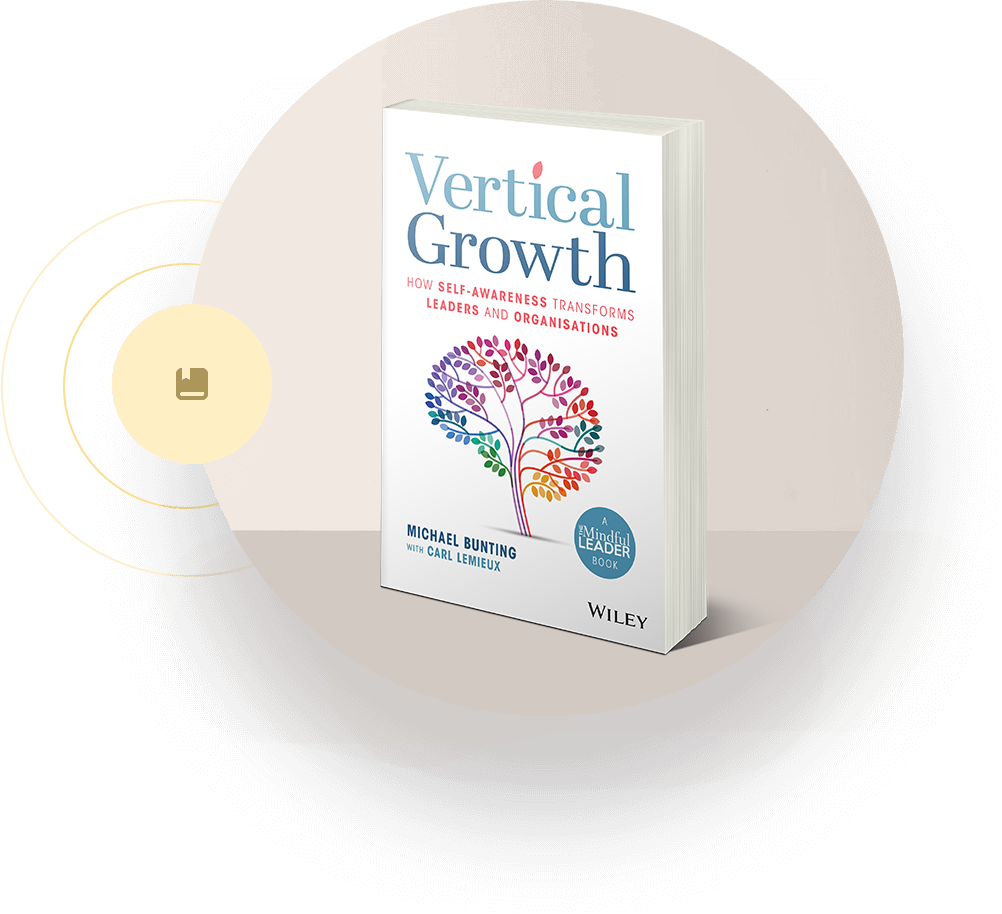Developing as a leader is about cultivating our inner strength to stay true under fire, to ask questions we don’t know the answer to, to stay balanced when our world is turning upside down, to stay kind and respectful when the heat of anger and frustration are coursing through our veins, to courageously hold ourselves and others accountable when we want to slip into avoidance and self-justification. It is about enabling ourselves to connect with others with authentic compassion, to truly understand them, to see their struggles and aspirations, the deepest desires of their hearts, their greatest potential. And, perhaps above all, it is to stay real, to
keep coming back to honesty and humility.
Unfortunately, all too often, when working or living in challenging conditions or under perceived threats, our reactive brain kicks in and our noble intentions can easily fly out the window in the service of protecting us from emotional discomfort. Training the mind to observe our mental and emotional patterns is therefore a great way to cultivate self-awareness and self-regulation, which are the cornerstone to transformational leadership.
Self-awareness training has been around for millennia and has been popularised in recent decades as a powerful way to train the mind and mitigate the undesirable reactions of our unconscious mind. I define self-awareness as maintaining an open-hearted awareness of our thoughts, emotions, bodily sensations and environment, paying attention in the present moment purposefully, warmheartedly and non-judgementally. It is experiencing and accepting the present moment — not how we want it to be, think it should be or perceive it to be, but as it really is. We can be mindful in any life situation — from driving, swimming or walking to leading, eating or writing.
Self-awareness is often confused with the practice of meditation alone. Meditation is simply the intensive practice of self-awareness for its own sake, just as a gym workout is intensive exercise for its own sake, though walking to the gym or work is also exercise. And just as if you go to the gym regularly, it becomes easier to walk up the hills to work, if you meditate regularly, it becomes easier to be mindful when it matters, such as when you are receiving tough feedback or someone is irritating you.
Through meditation and other self-awareness practices we become more aware of our habitual reactions, expand the gap between stimulus and response, and make wiser choices. We learn to recognise the inner motivations for our actions and become more honest and compassionate with ourselves. We learn to observe our perceptions, thoughts and judgements, rather than identifying with them and getting caught up in the mental stories we create. In short, we become profoundly self-aware, which is the key that unlocks the door to personal growth.
The greater our self-awareness, the greater our ability to self-regulate in real time. As Urs Karkoschka, Head of Human Performance Innovation at Novartis, describes it, ‘For many years in the development of my self-awareness, the second element of self-regulation was missing. I thought that being self-aware was enough. I would be aware of my anger, for example, while still reacting to it. So my awareness was not complete, because I was not using it to mindfully manage my behaviour. Self-awareness is great, but if you can’t mindfully self-regulate in the moment, it’s not much use to you.’
Self-awareness training helps us develop:
- a mind that is not constantly reactive and is more interested in reality than the fantasy world the unmindful mind is constantly lost in. This leads to more slow-brain, wise choices and actions.
- the inner strength to feel and embrace uncomfortable feelings, instead of resisting, reacting and numbing. This develops a profoundly strong, peaceful mind and deep self-understanding and wisdom.
- the ability to see through false assumptions, beliefs and judgements. It can literally take you all the way to the highest level of adult growth and make your entire ego structure ‘object’.
The research on self-awareness
One of the more fascinating discoveries the field of neuroscience has revealed about self-awareness is how it can literally change the structure and function of the brain, in the following ways:
- At the cellular level, meditation has been shown to change our brain chemistry by increasing the production of neurotransmitters and hormones associated with positive mood and feelings of relaxation and happiness. The practice of meditation has also proven to decrease concentrations of stress hormones and boost immune system function.
- At the structural level, the practice of mindful meditation has proven to change the structure of no fewer than eight regions of the brain. In the cortical regions of the brain, the home of cognition and executive function, researchers have demonstrated that meditation increases the volume and density of grey matter (neurons) as well as the density of white matter (axons) that connect specific regions of the brain. These findings provide substantial evidence that meditation effectively ‘rewires’ the brain through the process of neuroplasticity.
- At the functional level, the practice of meditation changes the pattern of electrical activity (neurons firing) observed in the brain. Functionally speaking, this observation helps to explain the increases in self-awareness, attention control and emotional regulation, and better decision making that result after even brief periods of mindful meditation training.
Taken together, these findings provide concrete evidence that mindful meditation training leads not only to subjective improvements in wellbeing, but to objective changes in the brain at cellular, structural and functional levels. There is clearly more than a placebo effect at play here. There’s a cause-and-effect relationship between the practice of meditation and neuroplastic changes in the brain that lead to improvements in depressive symptoms, feelings of happiness and executive function.
Hundreds of research studies show that self-awareness practice provides the following additional benefits:
- stress and anxiety reduction
- improved cognitive skills
- enhanced creativity
- stronger relationships
- increased compassion
- increased insight
- increased mental wellbeing
In his book Neuro Dharma, psychologist Rick Hanson cites many studies in support of the cognitive neuroscience behind self-awareness. One study showed that after just three days of self-awareness training, prefrontal regions behind the forehead exert more top-down control over the posterior cingulate cortex (PCC). The PCC is part of the default mode network that is active when we’re lost in thought or caught up in ‘self-referential processing’ (for example, Why did she look at me that way? What’s wrong with me? What should I say next time?). Consequently, greater control over the PCC means less habitual mind wandering and less preoccupation with oneself.
People who participate in self-awareness programs over the course of several months develop greater control over the amygdala, the source of our fight, flight or freeze response. They also grow more tissue in their hippocampus, a part of the brain that helps us learn from our experiences.
Experienced meditators, typically with years of daily practice, have thicker layers of neural tissue in their prefrontal cortex, which supports their executive function, such as planning and self-control. They also have more tissue in their insula, which is involved with self-awareness and empathy with others. Their anterior cingulate cortex, which helps us pay attention and stay on track with goals, is also strengthened. Furthermore, their corpus callosum, which connects the right and left hemispheres of the brain, also adds tissue, which suggests a greater integration of words and images, logic and intuition.
Clearly, self-awareness practice can have a profound effect on our ability to lead effectively and live a fuller, richer, more fulfilling life.
Zina Thaifa, a Business Unit Director for Takeda Pharmaceuticals in France, shared with me how her self-awareness practice benefits her every day. ‘When I practise self-awareness and take time to reflect,’ she explained, ‘it’s much easier for me to behave according to my values. When I am unmindful, I will often work too much and not get enough sleep. This distracts me from my values. So I’ve learned to prioritise self-care and self-awareness, to reflect and re-energise.
‘Self-awareness has also helped me to be much more curious, rather than judgemental, towards people. I really want to understand their story. And it’s made me more curious about learning in general. So self-awareness is a way of being curious and learning, then refreshing yourself — becoming a better version of yourself.’
Brian Gladsden, Head of Worldwide Commercial and Portfolio Strategy at Novartis Oncology, added, ‘There was a point in my career when my emotions were driving my actions too much. I was reactive, and it affected my judgement and damaged relationships. Self-awareness has given me space between my feelings and my reactions. I still have those triggers. They haven’t gone way. The difference is that I now have space to choose how I want to respond, rather than just reacting or acting out.’
Without the self-awareness that self-awareness can give us, all efforts to change our behaviour are much more challenging. Through self-awareness we can better observe our underlying conditioning and the emotional avoidance creating poor behaviour, then self-regulate in real time to consciously choose values-aligned behaviours. This is the heart of transformational leadership.








